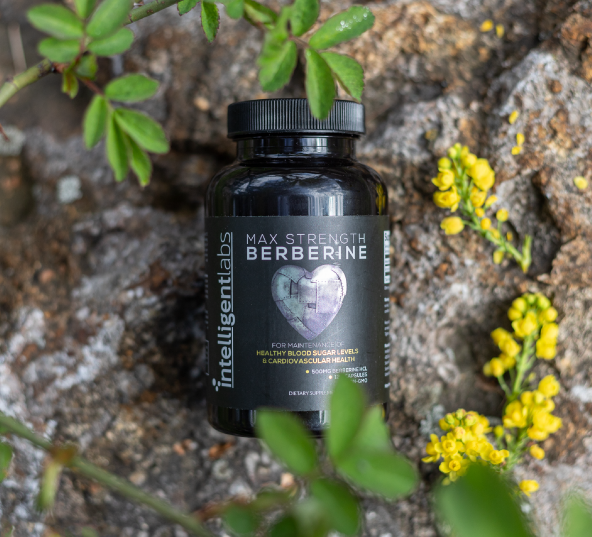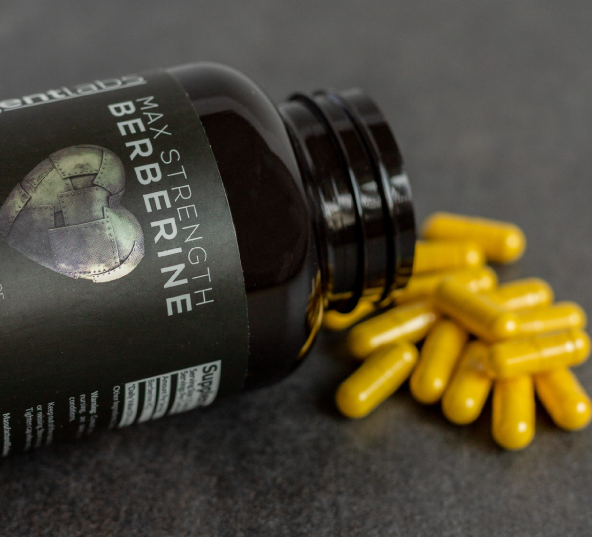Being overweight and obese is fraught with serious health risks. Diabetes, hypertension, heart disease, stroke, cancer, joint problems, and mental and psychological issues are just a few of these risks. Switching to a healthy lifestyle can help get rid of excess weight. But what about Berberine? Can it help with weight loss? Let’s find out if there’s any merit to taking this all-natural compound as a weight loss supplement.
Table of Contents
What is Berberine?
Berberine may be gaining popularity nowadays as a natural alternative to popular medicines. But its use in traditional Chinese, Ayurvedic, Middle Eastern, and South American medicine goes back thousands of years – long before pharmaceuticals came into the picture!
Berberine treats a wide range of health problems. Considered an all-around medicinal compound in many cultures, it can treat wounds and infections, fight inflammation, and cure various disorders.1
This alkaloid compound isn’t just found in the barberry shrub (Berberis vulgaris); it’s also present in many other plants and trees. Examples include goldenseal, yellowroot, tree turmeric, California and prickly poppies, amur cork tree, Chinese goldthread, and Oregon grape.
Is taking Berberine for weight loss really effective?
The short answer? Yes. Various studies support the claim that Berberine may help with weight loss. We’ll break them down for you in this section:
Study #1 shows that Berberine may help reduce visceral body fat
Yang et al. reported that Berberine may help reduce and even eliminate visceral body fat. They arrived at this conclusion after their subjects (patients with metabolic syndrome who took Berberine for 3 months) showed significant reductions in their BMI (body mass index) and waist circumference.
More specifically, the average BMI went from obese (31.5) to overweight (27.4). And the average waist circumference went down by 5.2cm!2

This is interesting because visceral fat is different from subcutaneous fat. It’s not stored underneath the skin, but hidden deep within the belly and wrapped around various organs. This makes visceral fat difficult to remove via liposuction (a quick but expensive way to lose weight).
This study’s findings present Berberine as a cost-effective solution to losing weight naturally, without all the risks and complications associated with liposuction, a major surgery.
Study #2’s subjects lost an average of 5 pounds per individual
In another study, Hu et al looked at both human and rat subjects. The human subjects were all obese and were given 500mg of oral Berberine 3 times daily for 3 months.3
After the experiment ended, the volunteers lost an average of 5 pounds per person. It might not sound like a lot, but there were other important results, too. For instance, triglycerides and cholesterol levels went down significantly.
The same outcomes were also reported in the rat subjects, showing that Berberine’s benefits go beyond weight loss.
Study #3 investigated the effects of Berberine on 1078 PCOS women
In a narrative review, Rondanelli and colleagues wanted to determine if Berberine can help with PCOS management. PCOS (polycystic ovary syndrome) has no known treatment but can be managed by healthy lifestyle changes.4
The researchers found that Berberine can indeed help PCOS women lose excess weight. They also observed a noticeable reduction in visceral fat and improved insulin sensitivity even in women who didn’t lose weight.
Related article: Berberine For PCOS: Is It A Viable Treatment Option?
Study #4 looked at the effects of Berberine on brown fat
According to another study, Berberine can help increase the fat-burning activity of brown fat, which also burns calories in the process. It can also help recruit and activate more brown fat cells.5

But why is this important though? What is brown fat anyway?
Well, brown fat is said to be the healthiest type of fat found in the human body. It contains more energy-burning mitochondria than white, yellow, or beige fats.
Brown fat is abundant in lean individuals. It’s naturally dense and firm and supports the overlying skin, giving the appearance of firmer and more youthful skin. On the other hand, white fat is more prevalent in overweight and obese individuals.
This study has demonstrated that Berberine’s effects on brown fat may help speed up the weight loss process, making this alkaloid compound a promising option for weight management.
What’s the right Berberine dosage for weight loss?
The clinically approved dosage for Berberine is 500mg taken 3 times daily with meals. Since Berberine is metabolized very quickly, it must be taken right before, during, or immediately after a meal.
This is the same dosage used in many of the studies we have referenced above as well as our recommended serving size for our Max Strength Berberine supplement.
Who shouldn’t take Berberine for weight loss?
Berberine’s side effects are on the mild side. It may cause stomach upset and headaches, especially if taken with other medications.
That said, pregnant and breastfeeding women shouldn’t take Berberine as it can cause serious damage to unborn fetuses and infants.6
Final words
Berberine’s health benefits go way beyond weight loss. It may help people with type 2 diabetes, women struggling with PCOS, improve insulin resistance in people with metabolic syndrome, and more. Read our ultimate guide to Berberine here to know more about the amazing benefits of this compound!
💬 Something on your mind? Share your thoughts in the comments. We love hearing from curious minds.
📩 And while you’re here, join our newsletter for more smart stuff (and secret perks)!
References:
- Neag, Maria A., et al. “Berberine: Botanical Occurrence, Traditional Uses, Extraction Methods, and Relevance in Cardiovascular, Metabolic, Hepatic, and Renal Disorders.” Frontiers in Pharmacology, vol. 9, no. 557, 21 Aug. 2018, https://doi.org/10.3389/fphar.2018.00557. ↩︎
- Yang, Jing, et al. “Berberine Improves Insulin Sensitivity by Inhibiting Fat Store and Adjusting Adipokines Profile in Human Preadipocytes and Metabolic Syndrome Patients.” Evidence-Based Complementary and Alternative Medicine : ECAM, vol. 2012, 2012, https://doi.org/10.1155/2012/363845. ↩︎
- Hu, Yueshan, et al. “Lipid-Lowering Effect of Berberine in Human Subjects and Rats.” Phytomedicine, vol. 19, no. 10, July 2012, pp. 861–867, https://doi.org/10.1016/j.phymed.2012.05.009. ↩︎
- Rondanelli, M., et al. “Polycystic Ovary Syndrome Management: A Review of the Possible Amazing Role of Berberine.” Archives of Gynecology and Obstetrics, vol. 301, no. 1, Jan. 2020, pp. 53–60, https://doi.org/10.1007/s00404-020-05450-4. ↩︎
- Wu, Lingyan, et al. “Berberine Promotes the Recruitment and Activation of Brown Adipose Tissue in Mice and Humans.” Cell Death & Disease, vol. 10, no. 6, 13 June 2019, pp. 1–18, https://doi.org/10.1038/s41419-019-1706-y ↩︎
- Jagetia, Ganesh C. “Anticancer Potential of Natural Isoquinoline Alkaloid Berberine.” Journal of Exploratory Research in Pharmacology, vol. 000, no. 000, 26 Apr. 2021, https://doi.org/10.14218/jerp.2021.00005. ↩︎




